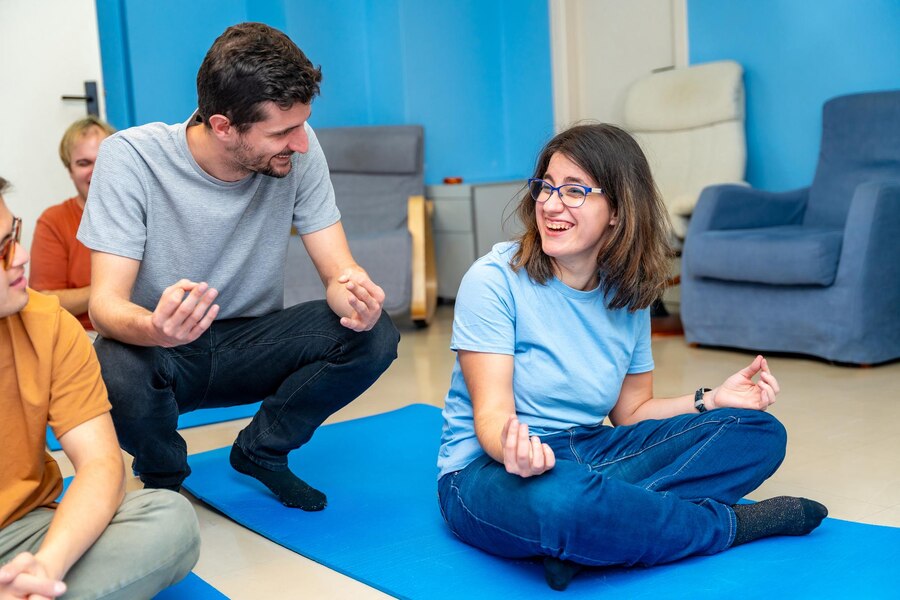Couples rehab is a transformative journey that not only affects the individuals undergoing treatment but also their families. The dynamics within a family can significantly influence the success of rehab, making it imperative to understand and address these relationships. When a couple decides to enter rehab together, they bring with them an intricate web of emotional ties, shared experiences, and collective challenges. These elements, when properly harnessed, can provide a strong foundation for recovery. Conversely, unresolved family issues can act as impediments, making the rehab process more arduous.
Family dynamics refer to the patterns of interaction between family members, including how they communicate, support each other, and resolve conflicts. In the context of couples rehab, these dynamics can either contribute to or hinder the recovery process. For instance, a family that fosters open communication and mutual support can create a nurturing environment conducive to healing. On the other hand, a family plagued by conflict, miscommunication, or emotional estrangement may exacerbate stress and impede progress.
Understanding family dynamics is crucial for several reasons. First, addiction often affects not just the individual but the entire family unit. The behaviors and attitudes of family members can play a significant role in both the development and the resolution of addiction issues. Second, involving family in the rehab process can provide emotional support, increase accountability, and offer diverse perspectives that enrich the treatment experience.
In couples rehab, the intertwining of two individuals’ lives means that their respective family dynamics can intersect in complex ways. Each partner’s family history, coping mechanisms, and emotional baggage can influence the other, making it essential for rehab programs to address these aspects comprehensively. By incorporating family dynamics into the treatment plan, couples rehab programs can create a more holistic approach that addresses not just the symptoms of addiction but also its root causes.
The Importance of Family Involvement
Family involvement in couples rehab is a cornerstone of effective treatment and long-term recovery. The dynamics within a family can significantly influence the rehabilitation process, either positively or negatively. Understanding the various ways family involvement impacts this journey is crucial for creating an environment conducive to healing and growth.
Emotional Support
One of the most immediate and tangible benefits of family involvement is the emotional support it provides. Recovery can be a physically and emotionally draining process for couples, and having a support network made up of loved ones can make a significant difference. Family members can offer a sense of stability and reassurance, helping to alleviate feelings of loneliness, anxiety, and depression that often accompany the recovery journey. This emotional anchoring can empower individuals to stay committed to their treatment plans and persevere through challenging times.
Creating a Supportive Environment
A supportive environment extends beyond the walls of the rehab facility. When family members are actively involved in the rehabilitation process, they can help create a nurturing atmosphere at home. This includes making necessary lifestyle adjustments that foster sobriety, such as removing triggers, establishing healthy routines, and promoting positive behaviors. A supportive environment also means that family members are educated about addiction and recovery, enabling them to provide the right kind of support and avoid actions that may inadvertently hinder progress.
Enhancing Communication
Effective communication is often one of the first casualties of addiction, leading to misunderstandings, conflicts, and emotional distance. Family involvement in rehab provides a structured setting for rebuilding these essential communication channels. Through family therapy sessions and guided interactions, couples and their family members can learn to express their thoughts and feelings constructively. This improved communication not only aids in resolving current issues but also lays the groundwork for healthier interactions in the future. Enhanced communication helps to rebuild trust and repair relationships that may have been strained or damaged by addiction.
In summary, the involvement of family members in couples rehab is not just beneficial but essential. Emotional support, a supportive environment, and enhanced communication are critical components that can significantly improve the chances of successful recovery. By actively participating in the rehabilitation process, families can help cultivate a strong foundation for lasting sobriety and healthier relationships.
Challenges Faced by Families
When couples embark on the journey of rehab, the involvement of their families can be both a source of strength and a complex challenge. Family members often find themselves navigating a labyrinth of emotional, financial, and social hurdles. Understanding these challenges is crucial for creating a supportive environment that fosters recovery.
Dealing with Stigma
One of the most pervasive challenges families face is the stigma associated with addiction. Society often views addiction through a lens of moral failing rather than as a chronic illness. This stigma not only affects the individuals undergoing treatment but also extends to their families. Loved ones may feel judged or ostracized by their communities, which can lead to isolation and a reluctance to seek necessary support. Overcoming this stigma requires a collective effort to educate communities about the nature of addiction, emphasizing that it is a medical condition that necessitates professional intervention and compassionate understanding.
Financial Strain
The financial burden of rehab can be significant, impacting the entire family. Costs can include the expense of the treatment program itself, potential loss of income due to time away from work, and additional out-of-pocket expenses such as travel and therapy. For many families, these financial strains can create stress and conflict, potentially undermining the supportive environment necessary for successful recovery. It’s crucial for families to seek out financial counseling and explore all available resources, including insurance coverage, sliding scale fees, and possibly even community-based support services.
Emotional Toll
The emotional toll on families during a couple’s rehab process can be profound. Watching loved ones struggle with addiction and the rigors of treatment can evoke a range of emotions, from fear and anxiety to anger and sadness. The uncertainty of recovery outcomes can further exacerbate these feelings, leading to emotional exhaustion. Families must navigate their own emotional landscapes while still striving to provide unwavering support. Access to mental health resources, such as counseling and support groups, can be invaluable in helping family members manage their emotional well-being.
In summary, families face a multifaceted array of challenges when supporting loved ones through couples rehab. Addressing the stigma of addiction, managing financial strain, and coping with the emotional toll are all critical components of fostering a supportive environment. By acknowledging and actively addressing these challenges, families can play a pivotal role in the recovery journey of their loved ones.

Strategies for Effective Involvement
Successfully involving loved ones in couples rehab requires a thoughtful and structured approach. The following strategies can help families engage meaningfully in the rehabilitation process, thereby enhancing the chances of long-term recovery for both individuals in the relationship.
Family Therapy Sessions
Family therapy sessions are a cornerstone of effective family involvement in rehab. These sessions provide a safe and controlled environment where couples and their family members can openly discuss their feelings, experiences, and concerns. Trained therapists guide these conversations, ensuring they are constructive and focused on healing. Family therapy can help address underlying issues that contribute to substance abuse, such as unresolved conflicts, enabling families to develop healthier communication patterns and stronger emotional bonds.
Educational Workshops
Education is crucial for families to understand the complexities of addiction and recovery. Educational workshops offer family members insights into the nature of substance abuse, the challenges of rehabilitation, and the importance of their role in the recovery process. These workshops often cover topics like the science of addiction, coping strategies, and how to support a loved one without enabling their behavior. By equipping families with knowledge, these sessions empower them to contribute positively to the recovery journey.
Support Groups
Support groups provide a community of individuals who are going through similar experiences. For families, joining support groups can be incredibly beneficial. These groups offer a space for family members to share their stories, receive emotional support, and learn from others who have faced similar challenges. Support groups can help reduce feelings of isolation and stigma, providing a sense of solidarity and shared purpose. Moreover, they can offer practical advice and coping mechanisms that families can use to navigate the ups and downs of the rehab process.
Involving families in couples rehab is not without its challenges, but with the right strategies, it can significantly enhance the recovery experience for everyone involved. By participating in family therapy sessions, attending educational workshops, and joining support groups, families can play a pivotal role in the journey towards lasting recovery.
Family Dynamics in Couples Rehab
The journey of recovery in couples rehab is not an isolated endeavor but a collective effort that profoundly benefits from the involvement of family. As we’ve explored, family dynamics play a crucial role in the rehabilitation process, providing essential emotional support, fostering a supportive environment, and enhancing communication among all members. This involvement not only aids in the recovery of the couple but also strengthens familial bonds, creating a more resilient and understanding family unit.
However, the path to effective family involvement is fraught with challenges. Families must navigate the stigma associated with addiction, manage financial strains, and cope with the emotional toll of supporting their loved ones. These obstacles, while daunting, can be mitigated with the right strategies and resources.
Engaging in family therapy sessions, participating in educational workshops, and joining support groups are pivotal strategies that can empower families. These approaches provide the necessary tools and knowledge to effectively support their loved ones through the rehabilitation process. They also offer a platform for families to share their experiences, learn from others, and build a network of support.
In conclusion, the active involvement of family in couples rehab is indispensable. It not only enhances the effectiveness of the rehabilitation process but also promotes healing and growth for the entire family. By acknowledging the challenges and embracing the strategies for effective involvement, families can play a vital role in their loved ones’ journey to recovery, ultimately fostering a healthier, more supportive environment for everyone involved.

FAQs
- FAQ: How does involving loved ones in couples rehab impact the overall recovery process? Answer: Involving loved ones in couples rehab can have a significant impact on the overall recovery process. It helps address family dynamics, improves communication, and provides a supportive environment for couples to heal together, strengthening their relationships and increasing the chances of successful long-term recovery.
- FAQ: What is the role of family therapy in couples rehab? Answer: Family therapy plays a crucial role in couples rehab by addressing the underlying family dynamics that may contribute to substance abuse or relationship issues. It provides a safe space for open communication, healing past wounds, and rebuilding trust among family members, creating a solid foundation for sustained recovery.
- FAQ: Can family members participate in therapy sessions at couples rehab? Answer: Yes, family members can participate in therapy sessions at couples rehab. These sessions may involve joint sessions with the couple, as well as separate sessions for individual family members to address their unique concerns and contribute to the healing process.
- FAQ: How does involving loved ones support relapse prevention in couples rehab? Answer: Involving loved ones in couples rehab supports relapse prevention by providing a strong support system for the recovering couple. Loved ones can learn about addiction, develop healthy coping mechanisms, and create a network of accountability, reducing the risk of relapse and promoting a sustainable recovery journey.
- FAQ: What types of activities are included to involve loved ones in couples rehab? Answer: Couples rehab programs involve various activities to involve loved ones, such as family therapy sessions, educational workshops, support groups for family members, and experiential activities that promote bonding and understanding among all participants.
- FAQ: Can loved ones participate in aftercare support programs following couples rehab? Answer: Yes, loved ones can participate in aftercare support programs following couples rehab. These programs may include family counseling, support groups, and educational resources to help loved ones continue their own healing journey and support the recovering couple during the transition to a sober lifestyle.
- FAQ: How can involving loved ones enhance the recovery outcomes of couples in rehab? Answer: Involving loved ones enhances the recovery outcomes of couples in rehab by fostering a supportive and understanding environment. It allows family members to learn about addiction, develop healthy communication skills, and contribute to the couple’s ongoing recovery efforts, ultimately improving the chances of long-term success.
- FAQ: Can loved ones participate in the treatment planning process at couples rehab? Answer: Yes, loved ones can participate in the treatment planning process at couples rehab. Their input and insights are valuable in creating a comprehensive treatment plan that considers all aspects of the couple’s relationship, family dynamics, and individual needs.
- FAQ: Are there any resources available for loved ones to educate themselves about addiction during couples rehab? Answer: Yes, couples rehab programs often provide resources and educational materials for loved ones to educate themselves about addiction. These resources can include books, articles, online courses, and workshops that offer valuable insights into addiction, recovery, and supporting a loved one’s journey.
- FAQ: How can couples and their loved ones find a suitable couples rehab program that involves family dynamics? Answer: Couples and their loved ones can find a suitable couples rehab program that involves family dynamics by researching and contacting rehab facilities that offer comprehensive couples programs. It’s essential to inquire about the specific family involvement components and ensure alignment with the couple’s needs and goals.











